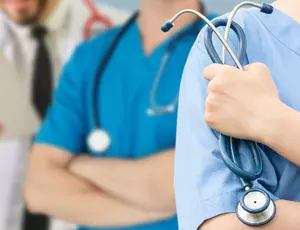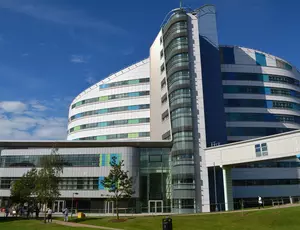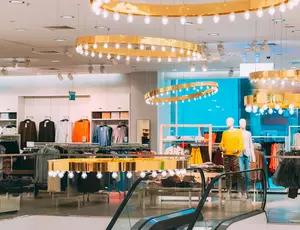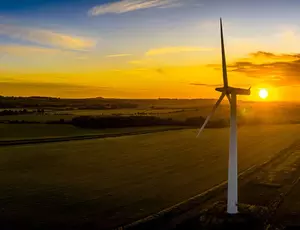How can Public Sector Decarbonisation Scheme (PSDS) funding benefit your organisation?
In this episode of 'Ask the Expert', Heather Foster (Sector Lead for Education, Healthcare & Public Sector at Veolia UK) explains what PSDS funding entails, who it's available to, and how we can support organisations to make the most of it.

Public sector organisations, including those in the healthcare and education sectors, are under pressure to reduce their carbon footprint in line with the UK's Net Zero goal.
The Public Sector Decarbonisation Scheme (PSDS) provides financial support for these decarbonisation ambitions through a series of grants. Over £1 billion has already been awarded by the scheme, with the next round of funding applications due to open in autumn 2023.
At Veolia, we work with organisations across the public sector to help them make the most of the funding, by working together to plan projects that can be delivered within the funding timescales. Tune in to this episode of 'Ask the Expert' to find out more about how we can support you to utilise PSDS funding as part of your decarbonisation plans.
How can PSDS funding benefit you? - Transcription
00:00:01:23 - 00:00:30:17
Speaker 1
Climate change is real and is happening as we speak. These changes can impose serious threats to human health and is causing more frequent and intense extreme weather events across the world. Global temperatures have risen by about one degree C and this figure is set to increase even more at Veolia. Our ambition is to achieve ecological transformation. If you want to learn more about how your business can play its part, join our panel of experts in our LinkedIn live series.
00:00:31:11 - 00:00:42:03
Speaker 1
Ask the expert. Follow us and look out for the notification when we have gone live to discover our innovative solutions and how we can all turn the tide on climate change.
00:00:46:02 - 00:01:17:24
Speaker 2
Good morning. Welcome everyone to this. The second episode of season two in Ask the Expert. It's where we come live to you through LinkedIn and you get to hear from the experts in the area who can help you deliver the ecological transformation you need in your business to be successful. Today, we're going to be talking about PSDS, the public sector decarbonisation scheme, which is something significant.
00:01:18:09 - 00:01:46:18
Speaker 2
It's something that's really important and it's the amount of funding that's available to support public buildings to decarbonize through three phases of grants. Well over £1 billion has already been awarded by the scheme and the next window for funding application is due to open in autumn this year. So it's a timely moment for you to become engaged, informed and to ask an expert how they can help.
00:01:47:13 - 00:02:08:10
Speaker 2
And the expert we've got with me today is the first of all, she's the first in amongst many because she's going to be our first two time person on us, the expert it's had to foster who is the sector lead for healthcare, education and the public sector here. Veolia. Heather, introduce yourself, please.
00:02:09:24 - 00:02:37:05
Speaker 3
Morning, Martyn. And morning, everybody else watching. So I said I'm the sector lead for healthcare, education, public sector. I've been working in the industry for about the last 17 years, I think, well, the energy projects, decarbonisation projects. And so I finished a mechanical engineering degree and did a graduate job. And then a couple of things before getting into the energy industry.
00:02:37:14 - 00:02:45:03
Speaker 3
So I've been supporting the NHS and public sector. So for most of that time, fabulous.
00:02:45:03 - 00:03:01:11
Speaker 2
So if anybody knows the answers to the questions that I've got each year, So let's get into it. Let's ask the question. PSDS okay, easy to say, but what does it entail and what can the funding be used for?
00:03:02:12 - 00:03:31:04
Speaker 3
Okay, so quote he said It's the public sector decarbonisation scheme and it's to fund capital works. So some people may have heard of the low carbon skills Fund, which is more about funding decarbonisation, plans or designs, whereas the idea is around funding capital works to help with heat decarbonisation and energy efficiency measures in public sector buildings.
00:03:33:10 - 00:03:44:01
Speaker 2
Okay, so I get that. So what sort of things are we talking about? You know what? What are we funding that I could go and touch and feel and play with?
00:03:45:14 - 00:04:16:12
Speaker 3
So initially you're looking at the age of some of your your assets in the organisation. So part of the criteria is that you must have fossil fuel heating system at the moment. So the big thing is trying to reduce the reliance on fossil fuels. So if you've got some fossil fuel heating at the moment and it's coming to the end of its life, which is another part of the criteria, then you can have a look at replacing that.
00:04:16:18 - 00:04:37:14
Speaker 3
It's something that's going to help you reduce your carbon emissions. So that could be he put so it could be associated with lots of heat from ground source heat pumps and it could be solar thermal, geothermal and and they that reduce reliance on the fossil fuels.
00:04:39:11 - 00:04:56:04
Speaker 2
Okay. So that's reducing the reliance on the fossil fuels and and things like that. But I know that some of the projects we're doing where I learned a great word when when we started to do it would again I think I sent it back the first time I saw it on some copy and said that fabrications isn't a word.
00:04:56:06 - 00:05:08:15
Speaker 2
What are we talking about here? So, you know, quite a few of the great projects that we have here at Veolia are engaged with the fabrication improvements. What sort of thing is is that talking about?
00:05:09:08 - 00:05:40:20
Speaker 3
Yeah. So the the idea of the scheme really is what they call a whole building approach. So you're looking at reducing your energy and energy demand to begin with. So things like you say fabric upgrades and insulation. So the reduce the demand then look at what's generating your energy and where you can do energy efficiency measures. So as you say, we've worked with a number of organisations where we've put in some fabric upgrades.
00:05:40:20 - 00:06:09:12
Speaker 3
So the cladding on the building to make that more efficient, keep keep the heat in and then look to maybe they've got old steam boilers, they've got steam distribution system, can we put in a heat pump and low temperature hot water distribution to provide the heating? And maybe we'll look at the building controls and some solar too to help them with the electricity growing.
00:06:09:15 - 00:06:36:01
Speaker 2
So so to summarize where we've got to so far, if you were interested in trying to apply for some SDS funding, you'd need to have a building. You obviously have something without a building, and I guess you have to own or lease that building overall. Yes. Yeah, yeah, yeah. You can't just be you've moved into it and you're going to be moving out and it needs to have a current fossil fuel heating system.
00:06:36:01 - 00:06:37:02
Speaker 2
Is that would that be right.
00:06:37:15 - 00:07:02:10
Speaker 3
Yeah. And not in heating system should be coming. Well it's part of the criteria. It needs to be coming towards the end of its life and there's an expectation that the organisation have got some budget set aside that they would be needed to spend to replace that existing equipment. And so that's part of the contribution that they would make to the scheme.
00:07:02:10 - 00:07:29:22
Speaker 3
So as you said earlier, the scheme has been in place for a couple of years now and the criteria is the tweaked and changed each time. And in the last round, which was the idea and three B the organisations need to make a contribution of at least 12%. So that the idea of that is that it's the like for like replacement costs with all that fossil fuel equipment that you're going to be taking out.
00:07:30:06 - 00:07:38:02
Speaker 3
So there's a sort of an assumption there that you've got that money because you were going to replace it anyway, so you contribute that deal scheme.
00:07:40:03 - 00:08:04:15
Speaker 2
Excellent. So it sounds relatively simple, but it also sounds logical. We can't be just tearing out pieces of equipment that are not approaching the end of their life. You know, we have to balance the economics, balance that with the needs of society and balance that with not wasting resource. So I'm interested, though, how would an organisation go about applying for the funding?
00:08:06:03 - 00:08:31:03
Speaker 3
Okay. So the as you mentioned earlier, the funding window is is open in autumn this year from our experience of supporting organisations in the public sector over the last couple of years, it's a very competitive process and something they introduced with three B was was a soft cap. So there was three different pots of money, if you like.
00:08:31:10 - 00:09:09:09
Speaker 3
So one part was the health care sector, one part for education. So universities, colleges, schools and then another part which was considered over. So maybe we've got a local government building or Ministry of Defense in site, something like that. And so there are different pots available. As I say, in the last round. We're not sure how that's going to look in the next round, but the application window comes open and I think it was 2:00 last time and people were, you know, it's a bit like getting tickets for a gig or football or something like that.
00:09:09:15 - 00:09:29:15
Speaker 3
You want to be there 2:00 and ready to submit your your application because it is very competitive. And we know of people that submitted applications even a few hours after they the sort of application portal opened and they were too late with their submission.
00:09:30:16 - 00:09:54:11
Speaker 2
Wow. Wow. So, so it is something that, you know, if you don't know what you're doing or perhaps you want to reduce the risk and improve your chances, a company like Veolia, a fine person like you could help them out, you know, where do we come in and how are we helping organisations to to get to and utilize this funding that's available.
00:09:55:17 - 00:10:25:02
Speaker 3
So a few different ways. So we are supporting some organisations with low carbon skills Fund and work that I mentioned earlier. So helping with those initial decarbonisation plans and maybe some detailed design schemes that can apply for this, but also asset surveys. So understanding the condition of the equipment that you've got, we can we can help out with that and then putting a project together.
00:10:25:02 - 00:10:46:05
Speaker 3
So I said it's very competitive. What one of the reasons we're doing this live today is because we want people to start to think about like projects and to get ready over the next couple of months to put a project together, look at the feasibility, what's the technology that they could use and who can install it for them?
00:10:46:17 - 00:11:09:22
Speaker 3
What's the program? And again, one of the things that asked as part of the application is, is are you going to be able to deliver this scheme to to the timescales. So there is a funding window and you need to spend that money within either a 12 month period or a two year period, depending on what type of scheme you've applied for.
00:11:10:07 - 00:11:29:13
Speaker 3
So there's an expectation that you can provide a program that gives you a list of when the work's going to take place and we can help with with all of that. And as I say, we've done that for a number of organisations already. So we're we're experienced knowing what what's required.
00:11:31:14 - 00:11:57:22
Speaker 2
Wow. I think you've just earned your two time. Ask the expert crown that you really are a decarbonisation expert and somebody I'm sure people will want to speak to if they're going to be trying to apply for this funding. Can the funding be utilized to to benefit? Something else, though? Is it just limited to replacing boilers, you know, or is it a little bit more?
00:11:58:17 - 00:12:07:23
Speaker 2
Is there a sense in there that there's more to this, you know, things like biodiversity? Can the funding be used elsewhere? I guess.
00:12:09:02 - 00:12:50:17
Speaker 3
Yeah. There's the sort of four measures, if you like, the funding can be used for. So the first one is like you say, to replace that lock up to replace the heating system with low carbon heating. And so that's got a direct impact on carbon emissions as an organisation. And then the other element that we talked about was in direct savings from things like fabric insulation, that kind of thing, so that she sort of second measure and or area two that you can use the funding for a third area is what we call like the indirect carbon savings.
00:12:50:22 - 00:13:28:18
Speaker 3
So usually it's electrical savings. So things like solar, as I mentioned, we've done some solar schemes, rooftop solar around solar carport led replacement. So in been quite popular because it's the sort of electrical savings as well as to the energy savings and then ventilation upgrades. So more energy efficient ventilation and so all the sort of the LED ventilation, that kind of thing all helped sort of contribute to user experience.
00:13:29:00 - 00:13:51:19
Speaker 3
And maybe in hospitals it helps patients. You know, this is lighting solutions out there that can dim the lights in at night for that and blinded, you know, in hospital beds and then solutions to students in education that improve concentration, that kind of thing. And so the money can be used for those things because it's an indirect carbon saving.
00:13:52:14 - 00:14:20:00
Speaker 3
And then the fourth area is sort of enabling measures. And in India, saving. And of course the organisation can use some of their contribution to, as you say, to do things like biodiversity projects. As part of the schemes we look at, we look at things like in planting in around boiler houses that were maybe upgrading or and the different things we can do with rooftops and that kind of thing.
00:14:22:11 - 00:14:54:15
Speaker 2
Fabulous. It really does fit into that sweet spot of Veolia style work where we're we're treating everything as an intangible whole and that everything is connected. So society, environment, economics, really great to hear from you, Heather. I'm going to ask you one final question again. People at Veolia tend to be people who have some interesting ideas, not just their work, but in their own lives.
00:14:55:05 - 00:14:57:22
Speaker 2
So what's your sustainability hat?
00:14:59:09 - 00:15:25:14
Speaker 3
And I suppose a couple of things really. I try and walk a lot, a lot more. So I set myself a little challenge using the app, the Strava up. So I walk my daughter to school, get in, get in the the miles, the kilometers. Some other people record it, but that stops me using the car or, you know, driving to take her to school or a lot of things.
00:15:25:24 - 00:15:45:16
Speaker 3
So yeah, I try and try want more. I do have an electric vehicle if if I do need to drive somewhere and also things like composting. Yeah. You know, composting food and that kind of thing. We've got a compost heap in the garden so and I try and do that as well.
00:15:46:24 - 00:16:10:05
Speaker 2
Excellent. Really are walking the walk and another step counting apps are available before we get Antarctica. That's great. Thank you for your time, Heather. That's been really helpful and useful to me and I'm sure plenty of the people in our audience today and plenty of people who'll watch this back in future days and weeks will take an awful lot from this.
00:16:10:17 - 00:16:39:10
Speaker 2
Anything that we've got that is useful, we will link into the comment section and Veolia is here to answer your questions. As Heather said, you know, we're encouraging people who are going to be eligible to take action now to start planning to see where your opportunity to apply for SDS funding could come from. Our next episode is going to feature another of Veolia decarbonisation expert David Bevan.
00:16:39:24 - 00:17:01:17
Speaker 2
We're going to be talking about whether businesses are currently doing enough to decarbonize. So please tune in on Tuesday, the 6th June at 2 p.m. Don't forget, you can listen back to all of our previous episodes of Ask the Expert at veolia.co.uk/podcast-hub. It's been great to speak to you Heather. Thank you very much everybody.
00:17:01:17 - 00:17:03:22
Speaker 2
We'll see you again soon.
How can Veolia help the public sector?
How can Veolia help?
Find out more about how we can support your business.
Our experts are always on hand to deal with your request.





